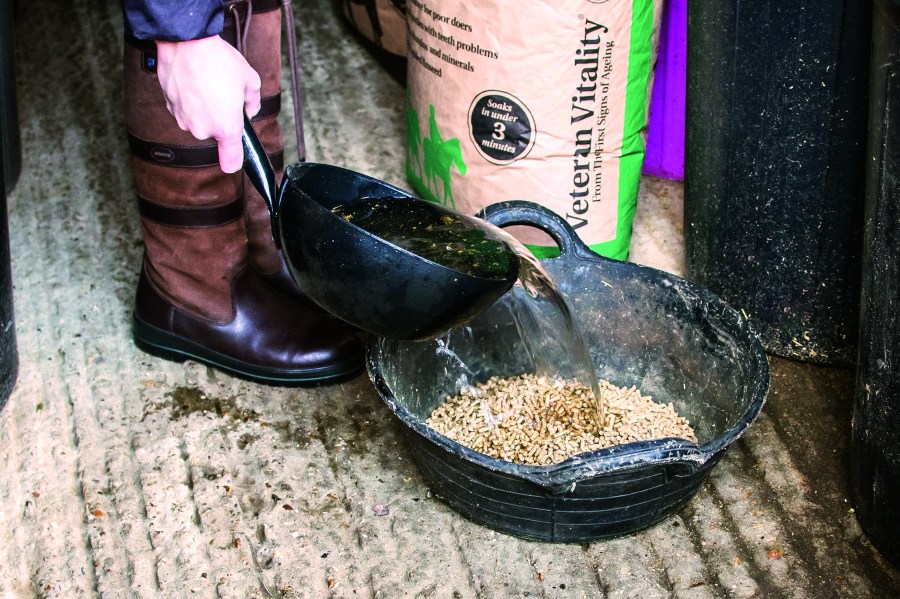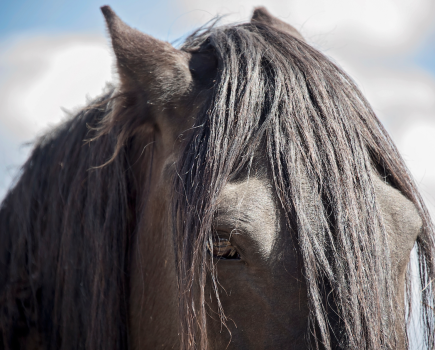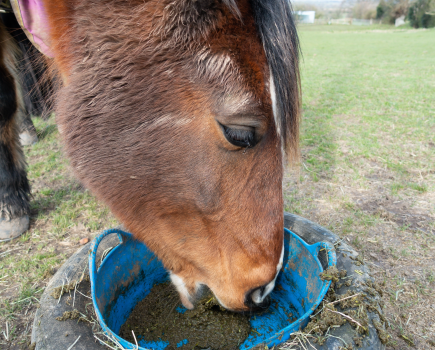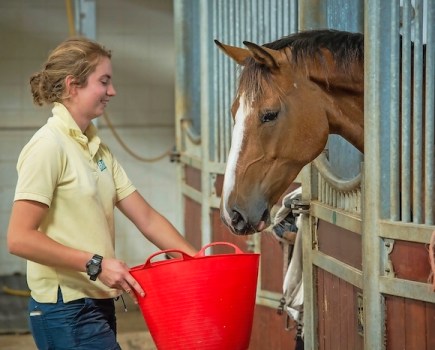In partnership with Allen & Page
Whether your veteran is enjoying a well-earned retirement, hacking lightly or still competing regularly, their diet should reflect their energy requirements for maintaining good weight and condition. It must also provide fuel for their work, which in turn helps maintain a calm, even temperament and good behaviour, explains Allen & Page nutritionist Jo Palmer.
It is known that as horses age, their digestive systems become less efficient, and their ability to digest food and absorb nutrients such as proteins, vitamins and minerals reduces. This means that older horses are more likely to lose weight and condition, so choosing a more nutrient- dense and higher-calorie bucket feed may be beneficial, particularly for poorer doers and those still with active working lives.
Choose low starch and sugar
Choosing feeds that use fibre and oil as sources of slow-release energy and avoiding the fast-release energy that comes from starch and sugar is highly beneficial. A diet high in starch and sugar is harder for veterans to digest and can raise colic and laminitis risk.
Too much starch and sugar can affect some horses’ behaviour negatively, making them over-reactive, sharp and excitable. Choosing feeds that are low in starch and sugar is highly beneficial all round. As good practice, any changes to the type or quantity of feed should be made gradually to help prevent digestive upset.
Soaked feed
One of the most important qualities of a feed for veterans is that it is easy to eat. A veteran horse with poor teeth is more at risk of suffering choke and colic, simply because they are not able to chew properly. A bucket feed that can be soaked with water to form soft, palatable mashes is often relished by even the fussiest of feeders.
Soaked feeds have the added benefit of increasing water intake, in turn helping to keep horses hydrated. This is beneficial for older horses in winter, when their consumption of moisture-rich grass declines, and they may be reluctant to drink sufficient water to meet their needs.
Veterinary considerations
When choosing a suitable veteran feed, any veterinary issues must be taken into account to ensure that the diet is suitable for the horse as a whole, and not just in relation to their age. Laminitis is more common in veterans, often as a side effect of Cushing’s and equine metabolic syndrome. Choose a feed that is free from whole cereal grains and molasses, with a combined starch and sugar level of less than 10% for any horses that are at risk.
Fibre’s role
Regardless of age, fibre is the most important component of every horse’s diet and while grazing and supplementary hay or haylage is likely to satisfy the fibre needs of a younger equine, the decline in dental condition that occurs naturally with age can greatly affect a veteran horse’s ability to chew long fibre.
Inevitably, winter means grazing quality declines and there is a greater reliance on conserved forage (hay and haylage) as an essential fibre source, but many veterans simply don’t eat enough of it to meet their fibre needs.
Insufficient fibre in the diet not only leads to weight loss, but it can also increase the risk of a horse developing boredom-related stable vices, gastric ulcers and digestive upsets, all of which will affect their health and well-being.
Supplementation
It may be necessary to supplement a veteran horse’s grazing and hay with alternative fibre sources that can be easily chewed and digested. A quick-soaking feed that can be fed as a partial forage replacer will help meet a veteran’s fibre needs. Other good sources of fibre, such as chaffs and unmolassed sugar beet, can be offered alongside to provide a buffet style choice of food.
This approach is particularly useful for fussy feeders as it helps maximise fibre intake and allows an important trickle feed of fibre through the digestive system.
Not only is fibre essential for good digestive health, but also its digestion offers a good source of calories and creates body heat as it ferments in the gut, providing the horse with their very own central heating system during the winter.
The bigger picture
It is likely that your horse’s nutritional needs will vary significantly during their veteran years and also as the seasons change. Routine dental check-ups, faecal worm egg counts and an effective worming programme will all help keep the digestive system healthy. Regularly assessing their weight and body condition, as well as carefully monitoring their energy levels, teeth quality and ability to graze and eat hay properly will help you to decide when feeding and management changes are necessary.
What to look for in veteran feed
Poor doers
A feed with a digestible energy (DE) level of 11MJ/kg will provide a step up in calories from most standard mixes and cubes to help older horses maintain weight. Choose one which has been carefully formulated to provide all the nutritional requirements for optimum health in older horses and ponies.
A good protein level will help maintain muscle condition and topline, while a probiotic and blend of prebiotics aids healthy digestion, and linseed is a good source of Omega 3 oils. A balance of vitamins and minerals is also vital for all-round health, while vitamins E and C are important antioxidants for veterans.
Good doers
Not all old horses lose weight. Some will remain good doers for their entire lives and do not need a high-calorie bucket feed. Keeping a good doer at an ideal weight and body condition score is essential to avoid placing additional strains on the horse’s organs and joints. Choose a feed made specifically for veterans with a lower calorie (energy) level (around 8 MJ/kg) to help them maintain condition well into their later years.
Meet the expert: Jo Palmer has a BSc (Hors) in agriculture with animal science and is a member of the Allen & Page nutrition team, helping to guide owners on feeds and feeding.








